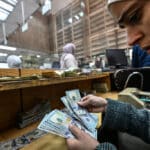
By Maher Salameh – Sep 24, 2024
In response to the brutal military campaign launched by the Israeli enemy against Lebanon on Monday, the Islamic Resistance in Lebanon has begun to strike targets deep in the occupied territories. Much of the northern occupied territories has come under the fire of the Resistance in Lebanon after the Resistance began to strike Haifa consistently on Saturday. This increases the economic risks that threaten the stability of the enemy entity due to the importance of the northern region for the Zionist occupation economy.
According to the Manufacturers Association of Israel, the region contains roughly 700 factories employing nearly one-third of the country’s industrial workforce. Disrupting the work of one-third of the industrial workforce could have very severe consequences on the volume of Israeli industrial production. This could contribute to a shortage of goods locally or a deficit in exports. In both cases, the repercussions on the Israeli economy will be significant.
Since the beginning of the war, the Israelis have suffered significant economic damage. This is especially true in the north near the Lebanese border, which has experienced near-shutdown after the mass evacuations of settlers at the start of the war. Losses were concentrated in the agricultural sector, which is very active in areas adjacent to the Lebanese border, and in the industrial sector after many factories near the northern border lost their workers and are still unable to acquire necessary raw materials.
Inbar Bezek, former Knesset member and current CEO of Galilee Economic Company, told the Jerusalem Post that the industrial sector employs about 20% of the northern region’s population, noting that many factories in the north are partially or wholly foreign-owned. She explained that this means many factory owners may leave, leading to job losses. “When factory owners are not Israeli, they will start asking themselves: Why do I need this headache?” she added, noting that some factories were already considering relocation options before the expansion of the war. Those concerns will escalate when the Resistance begins targeting factories and economic centers in the north.
The Israeli northern region includes factories operating across a wide range of economic sectors. The Haifa area, in particular, is characterized by a diverse industrial landscape that plays a crucial role in the region’s economy. Among these key industries is the oil refining sector, as Haifa houses the most important oil refineries that produce various petroleum products—including polyethylene and carbon black—which support plastic industries, with facilities for producing potassium nitrate and phosphoric acid for local use and export. This is in addition to a large electrochemical sector used in the manufacturing of food and other essential consumer goods.
Haifa also houses MATAM, a leading technology park which focuses on research and development, pharmaceuticals, mining, raw materials, and food production. Any disruption to this production chain would pose significant economic risks, given the city’s strategic importance.
Translation: Orinoco Tribune
OT/DZ/JRE/SL




